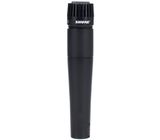F
Input levels very low
Plugging in a Focusrite I have to crank the input gain close to the max to have reasonable levels for both speech and acoustic guitar. Sound quality is nice, but at this gain level noise starts to creep in. Probably works well if you are singing or micing amps.
0
0
Report
M
Chinese, not Mexican.
Made in China.
Assembly and paint quality is a bit lower from Mexican ones that I always had.
It looks like best things are reserved for US these days.
Still, this thing works, can recommend.
Assembly and paint quality is a bit lower from Mexican ones that I always had.
It looks like best things are reserved for US these days.
Still, this thing works, can recommend.
0
0
Report
S
Shure SM57 LC vs Rode NT1-A
I got both the Shure SM57 LC and the Rode NT1-A to compare them to each other. My goal is to record music at home.
Both have their charms. The Shure SM57 LC is very sturdy and has the benefit that it doesn't need phantom power. It's also a lot lighter and smaller. Both do well in the lower sound ranges. Although I would say that the Rode NT1-A does slightly better in that aspect. But in high sound ranges the Rode NT1-A is a clear winner. It has a crisper sound than this microphone. This is by all means a very good and though microphone for a good price. But if you have to pick one I would suggest the Rode NT1-A, which is only slightly more expensive.
Both have their charms. The Shure SM57 LC is very sturdy and has the benefit that it doesn't need phantom power. It's also a lot lighter and smaller. Both do well in the lower sound ranges. Although I would say that the Rode NT1-A does slightly better in that aspect. But in high sound ranges the Rode NT1-A is a clear winner. It has a crisper sound than this microphone. This is by all means a very good and though microphone for a good price. But if you have to pick one I would suggest the Rode NT1-A, which is only slightly more expensive.
2
1
Report
P
Truly a classic, BUT...
Great microphone, well done and super quality components. I own it since 2018 and I am happy about it. The only negative side is that its sound is more projected on the mid high frequencies so I had to buy another microphone which projects on the middle bass frequencies to pair it with the SM57.
0
0
Report
P
Most used for a reason
What else to say than that this is the microphone most people use to record their guitar with. The sound is good for the price and this will always remain a standard in any recording environment.
0
0
Report
U
A studio must have.
There's a reason for virtually every studio everywhere to have a bunch of this hanging arround for the past fifty years . They're cheep, versatile, resistent and well built.
You can use one of this in studio conditions on snares and drums all arround (there's people that even use them on bass drums), guitar cabinets from funk to metal.
Even in live conditions this are great for vocals.
if you what to record a snare drum just throw one SM57 and you wont be desapointed by the result
You can use one of this in studio conditions on snares and drums all arround (there's people that even use them on bass drums), guitar cabinets from funk to metal.
Even in live conditions this are great for vocals.
if you what to record a snare drum just throw one SM57 and you wont be desapointed by the result
0
0
Report
S
Nice
Most people seem to use these on instruments, especially drums. I find them really nice for vocals. I like the darker sound they have. It means I spend less time EQ'ing. Just be sure to use a pop shield!
1
0
Report
s
good
I use it for my home studio. Good microphone.
0
0
Report
E
Everyone should have one
It's a very good mic for recording electric guitar (especially distortion) but I also use it for acoustic guitar and vocals with decent results.
For better results you should connect the mic to a good preamp. In order to capture sound the source has to be a little bit loud. Using just an USB audio interface will not give the best results.
If you're not a studio owner (and probably most of you are not ) you should improve the sound quality in the room by adding some absorption panels. Having a decent environment it's really important.
It's not the best mic in the world but for the money you pay you get a lot of versatility and I don't think there is a studio on this earth who doesn't have one. I saw people recording all kind of instruments so it's a must have!
The build quality is very good, it feels solid.
For better results you should connect the mic to a good preamp. In order to capture sound the source has to be a little bit loud. Using just an USB audio interface will not give the best results.
If you're not a studio owner (and probably most of you are not ) you should improve the sound quality in the room by adding some absorption panels. Having a decent environment it's really important.
It's not the best mic in the world but for the money you pay you get a lot of versatility and I don't think there is a studio on this earth who doesn't have one. I saw people recording all kind of instruments so it's a must have!
The build quality is very good, it feels solid.
0
0
Report
di
overhyped? or an essential classic, juries still out
excellently strong build quality, but thinly voiced. Bought on advice, only been using this for a snare drum so far, finding it best on the underside given the crispy sound of this mic. Yet to try its full range on a guitar amp or similar - While I can see why this mic has such a strong reputation, I prefer the sound of my snare even in C1000s overheads to this SM57 close up in different positions. That said it does sound clear and bright on its own and really will take a beating, both sonically and physically - for a £100 mic, I am impressed and pleased to have it in the 'tool kit'
0
0
Report







